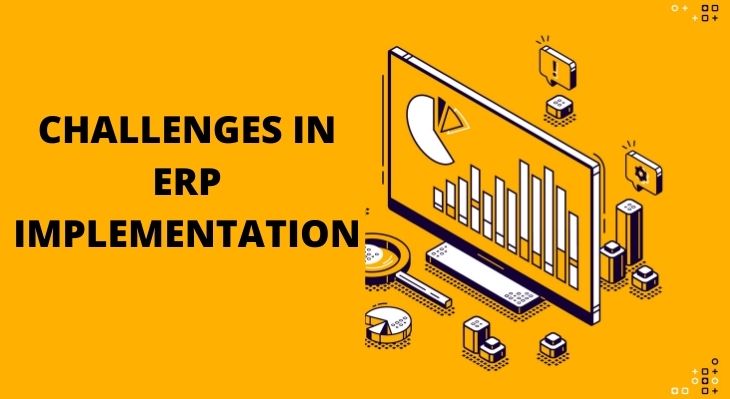Did you know that the global ERP software industry expanded by 9% in 2019, resulting in total software revenue of around $39 billion worldwide?
As you prepare to transition to a new ERP system, you have many pressing details to address. Yet, it’s also essential that you take time to step back and examine the bigger picture.
It’s not enough to buy a new ERP software package for your organization. In the process, we can help you avoid common ERP implementation problems that many companies experience.
Not sure where to begin? How to implement ERP? Keep reading to learn more.
Defining the Scope of Your ERP Project
One of the challenges of successful ERP implementation is defining the scope of your ERP project. You need to consider what exactly you want to achieve with your ERP system and what processes and data you need to include in the scope of your project.
This can be a complex and difficult task, as there are often many different stakeholders who need to consider. Another challenge is ensuring that all the different parts of your ERP system work together.
Often requires customization and integration work, which can be complex and time-consuming. Finally, you need to test your ERP system implementation before rollout to ensure that it meets your requirements and will work in your organization.
Define Your End Results
You need to define your results and objectives from the outset. This will ensure that everyone involved in the project is aware of the goals and can work towards them.
Choose the right ERP software and a partner to work with. There are many ERP system implementations on the market, and it can be difficult to know which one is right for your business.
You need to do your research and speak to other businesses that have implemented similar systems before making a decision. Finally, you need to ensure that you have a dedicated team in place to manage the project and see it through to completion.
ERP implementation best practices can be a complex and time-consuming process, so it is important to have someone willing to devote the necessary time and resources to ensure its success.
Assembling the Right Team
An effective ERP implementation team must have a good mix of business and I.T. skills and knowledge. Furthermore, the team must be able to work together to ensure a successful outcome.
But, finding the right mix of people with the necessary skills can be a challenge. Another challenge is ensuring that everyone on the team commits to the project.
With any large and complex project, there will always be some team members who are not invested. This can lead to a lack of progress and a higher chance of failure.
ERP implementation best practices need careful planning and execution. There are a lot of moving parts, and if any one of them is not managed, it can jeopardize the entire project.
Thus, it is important to have a team that has experience in project management and has a good track record of delivering successful projects.
Reusing Old Workflows
Customization and process changes need to take full advantage of an ERP system. Many organizations try to take their old business processes and “bolt-on” an ERP system, only to find that their business doesn’t run anymore.
There can be a lot of resistance to change within an organization, but it’s essential to reap the benefits of an ERP system. Otherwise, you’re paying for an expensive piece of software that isn’t adding any value to your business.
Overcoming Organizational Resistance to Change
One of the biggest challenges is overcoming resistance to change from within the organization. Employees may be hesitant to embrace the new system and may resist changing their current workflows.
It is important to provide education and training to employees on the new system and its benefits. Change management strategies should take place to help ease the transition.
Another potential challenge is data migration. Data can be time-consuming and difficult to transfer into the new system. It is important to have a plan in place for how data will migrate and test the process before going live.
Other challenges can include integrating the new system with existing systems, lack of user adoption, and unexpected costs.
Make A Long Term Strategy
Taking into account how your business will grow and change over time, and making sure that your ERP system can accommodate those changes. It’s also important to have a clear idea of your business processes and how they will affect you.
If you can map out your processes and understand how they will change, you can make sure that your ERP system configures to support them. Finally, don’t forget about training.
It requires that your employees train on how to use the system. Make sure to divide enough time and resources into training so that your employees can be up and running on the new system as soon as possible.
Make User Training a Priority
One of the most important and often overlooked aspects of a successful ERP implementation is user training. It is not enough to provide users with access to the new system.
They need to train on how to use it to maximize its potential. Unfortunately, due to the time and money involved, this can be difficult.
Proper user training requires a significant upfront investment, but it will pay off in the long run in the form of a more efficient and effective workforce. By making user training a priority, organizations can improve the chances of successful ERP implementation.
Data Management and System Integration in ERP Projects
All your organization’s critical data must be gathered, cleansed, and migrated into the new system. This can be a daunting and complex task.
Another difficulty is getting all your diverse systems to communicate and collaborate. This often requires custom integration work and can be very time-consuming and expensive.
But if successful, it can result in a streamlined and efficient organization that can better compete in today’s marketplace.
Choose the Best ERP Implementation Partner
The partner must have the necessary expertise and experience to put in place the ERP system. They must also be able to understand the specific needs of the organization and tailor the ERP system to meet those needs.
Furthermore, the partner must be able to provide adequate support during and after the implementation. Choosing the right partner is critical to the success of an ERP implementation.
Live and Post-Implementation Considerations
The successful implementation of an ERP system is a complex process that requires careful planning and execution. Some factors can impact the success of an ERP project, including the size and complexity of the project, the organizational culture, the commitment of senior management, and the availability of skilled resources.
Live is an important milestone in any ERP project, and all necessary preparations must be done before this phase. Once the system goes live, there will be a period of change as users learn the new system and procedures.
It is important to have a solid post-implementation support plan in place to ensure that the transition is smooth and that any issues that arise. The challenges of successful ERP implementation can be overcome with careful planning and execution.
Set a Realistic Timeline and Budget
One of the keys to success is setting a realistic timeline and budget for the project. All too often, organizations underestimate the time and resources required.
This can lead to delays, cost overruns, and frustrated users. A realistic timeline and budget will help ensure that the project stays on track and within budget.
As your company grows and expands, you can increase the size of your ERP license. If you outgrow your present version, you won’t have to worry about a system migration unless you visit the NetSuite Implementation Price. Once you’ve changed your subscription to the correct edition, you’re done.
Focus on Getting the Right Data Into the System
Too often, organizations focus on getting the data into the system without taking the time to ensure that it is accurate and complete. This can lead to problems down the road when the data use to make decisions.
To avoid this, take the time to ensure that the data is of high quality before it enters the system.
Ensure the Success of Your ERP Implementation
Although ERP implementation can be challenging, it is possible to overcome these challenges with a holistic and well-planned approach. Successful ERP implementation can lead to increased productivity, efficiency, and ROI for your organization.
Make sure your project stakeholders agree on the cost of performing this migration for your company. Improve productivity, reduce errors in billing and purchasing, and make financial decisions more.
We hope that you found this article useful. For more business, IT, and employment product guides, be sure to check out useful reads.



